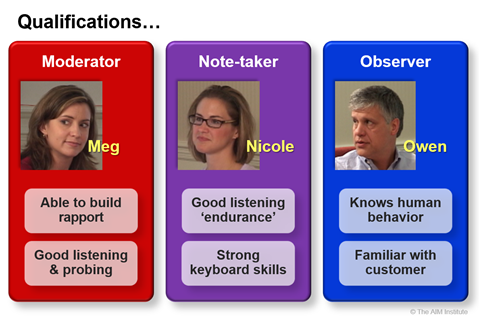2. Qualifications and tips for each interview role
Here's what great Moderating, Note-taking and Observing looks like in an interview.
We’re often asked if the Moderator, Note-taker and Observer roles in a Discovery interview should be taken by certain job functions, e.g. marketing, technical, or sales. No, it’s really a matter of matching people’s qualifications to the interviewing role. That said, if you’re a technical guru on this subject, you might be uncomfortable asking, “So how does this technology work?”
Or if you’ve been the sale rep for this account many years, it could be awkward asking, “Can you tell me more about your business model?” So someone from the head office, e.g. marketing, often takes the Moderator role. Consider these qualifications and tips…

Moderator: The Moderator should be outgoing and friendly… someone who can quickly establish rapport with customers. This person should have strong listening and probing skills. If this is your role, consider practicing the probing methods discussed in How to probe during interviews. Here are some tips:
- Keep an eye on the screen to see if the Note-taker is falling behind. To slow the pace and let them catch up, recap customer comments and occasionally direct the customers the screen to “see if we’re getting everything OK.”
- Use your “what and why” probing: Ask observational “what” questions first (when does this happen, please describe that…), followed by implication “why” questions (how does this impact you?)
- Never sell, never solve… just search. You might want to start the meeting by laying out these “ground rules,” so you can “remind” yourself and your team later if someone starts selling or solving during the interview.
- Not sure if you’re done probing on an outcome (single sticky note)? Simply ask, “Anything else we should know about this before we move on? Then, when you’re done with this outcome, ask “What else?” and move to the next note.
- Don’t ask leading questions or long, “clever” questions, e.g. “Would it help if…” Just give the customer permission to keep going by asking “Could you describe that?” or “What else?”
- Keep your Discovery Interview Quick-Start Card in front of you (downloadable at blueprintingcenter.com > BlueTools > Conduct Discovery Interviews)… with the second side face-up. Both you and the Observer can use this to help with transitions, your “What-and-Why” probing, and creating Outcome Statements.
Note-taker: The most important qualification for the Note-taker is strong keyboard skills. Don’t worry: You don’t need to capture everything the customer says… but you don’t want to slow the meeting down too much either. You’ll also need good “listening endurance”: It can be quite tiring to keep a high level of attention during a long interview. Consider these Note-taker tips:
- Try to capture as many of the actual verbatim words coming out of the customers’ mouths as you can. As much as possible, try to get full phrases or even sentences. Just a few words scattered on your sticky notes won’t be as helpful to those reviewing your notes later (perhaps in years to come).
- Don’t wait to “summarize” the customer’s comments. Type what they’re saying as they say it. What if you don’t understand their comments? That’s OK… type them anyway. You or another team member can then ask for clarification.
- Just type one outcome per sticky note. When you hear the Moderator ask, “What else?” that’s your cue to move to the next sticky note.
- Spend some time getting comfortable with Blueprinter software, especially in Discovery Noteboards. For instance… a fast way to move from sticky note to sticky note is using your keyboard’s “tab” key. Also, if you need to transfer some content on a sticky note, just highlight the text and you’ll see an option to move it to the next empty sticky note.
Observer: This role is often taken by the sales professional for the customer being interviewed (when possible). Why? Sales pros often understand human behavior well. And if this is an existing customer, their familiarity will let them pick up on cues, such as impatience or enthusiasm. Here are some Observer tips:
- Ask plenty of probing questions, using the same methods the Moderator uses. The Moderator can get exhausted thinking of probing questions, and you can take a lot of pressure off him/her with your questions. (But let the Moderator decide when to move on to the next sticky note.)
- Take some private handwritten notes on a pad of paper. If you feel a customer’s comment needs clarification, bring this up during the interview. But if the Note-taker wasn’t able to record some details, write them down and give them to the Note-taker during your post-interview de-briefing session.
- During the interview, keep your Discovery Interview Quick-Start Card in front of you (downloadable at blueprintingcenter.com > BlueTools > Conduct Discovery Interviews)… with the second side face-up. You can use this to help the Moderator with “What-and-Why” probing, and creating Outcome Statements.
For more, see e-Learning Module 13: Interview logistics at www.blueprintingcenter.com > e-Learning.
Keywords: Discovery interview, Preference interview, New Product Blueprinting, moderator, note-taker, observer, interview roles, verbatim, moderating, note-taking, observing, listening, probing, keyboard skills